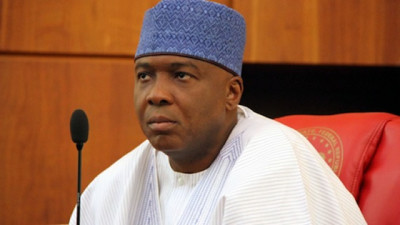
Senators were yesterday under attack for summoning the Chairman of the Code of Conduct Tribunal (CCT), Justice Danladi Umar, who is presiding at Senate President Bukola Saraki’s trial for alleged falsification of assets.
The Nation exclusively reported yesterday that the Senate Committee on Ethics, Privileges and Public Petition on Monday summoned Justice Umar to appear before it tomorrow in respect of an allegation of corruption levelled against him.
The invitation, coming on a day the judge ruled that Saraki’s trial should run daily, appeared a new twist to the matter.
The CCT chair immediately wrote the panel that he will not be available because he has a matter he is handling.
To some senior lawyers, the senators were wrong to have invited His Lordship.
Professor of law Fidelis Oditah (SAN, QC), rights activist Femi Falana (SAN), Norrison Quaker (SAN) and law teacher Wahab Shittu, in separate interviews, said the invitation of the CCT chair, apart from raising suspicion, was illegal and uncalled for.
But Chief Felix Fagbohungbe (SAN) expressed a divergent view.
In Oditah’s view, the Senate does not have the powers to invite Justice Umar over allegations of corruption, thereby preventing him from performing his duties.
“ They don’t have such powers. Are they a court of law themselves?” he asked.
According to him, the Senate’s oversight functions include monitoring of how monies appropriated to agencies are spent, not to invite anyone over a corruption allegation like an anti-graft agency.
He said Justice Umar’s invitation when the Senate President is undergoing trial before him is suspect.
Quakers said Justice Umar cannot abandon his assignment to answer the Senate’s call.
He said Justice Umar should tell the Senate through a representative that the Administration of Criminal Justice Act 2015 mandates him to conduct a criminal trial day-to-day and that he is bound by that law.
“The invitation at this time raises a lot of suspicion. But Justice Umar can handle it administratively so that it won’t appear as if there’s a political angle to it,” he said.
In a statement titled: “The illegal summons on Code of Conduct Tribunal Chairman”, Falana accused the leadership of the Senate of “attempting to frustrate the ongoing trial of the Senate President”.
Describing the action as a “contemptuous reaction”, Falana said: “It is pertinent to point out that the Ethics Committee of the Senate lacks the power to summon the Tribunal Chairman to testify in respect of a criminal investigation.
“More so that the allegation being examined by the Ethics Committee of the Senate is the subject matter of a pending criminal case at the High Court of the Federal Capital Territory sitting in Abuja.”
Falana recalled that “following the allegation that the Personal Assistant of the Tribunal Chairman allegedly received a bribe from a suspect on behalf of his master, the matter was investigated by the Economic and Financial Crimes Commission. At the end of the investigation, the Tribunal Chairman was exonerated while his Personal Assistant was indicted. Consequently, the suspect has since been charged to court. Since the case has not been concluded or terminated, it is the height of contempt on the part of the Senate or any of its committees to decide to conduct another trial on the same subject matter.”
He added: “The Ethics Committee of the Senate is advised to withdraw its illegal summons which has been issued and served on the Code of Conduct Tribunal Chairman.
“Instead of exposing the Nigerian people to further undeserved embarrassment over the Saraki case, the Senate is enjoined to enhance the fight against corruption by passing the Whistle Blowers Bill, the Proceeds of Crime Bill and the Witness Protection Bill, which were passed by the 7th National Assembly but were not signed into law by former President Goodluck Jonathan. For the Nigerian people to take the war against corruption seriously, the members of the legislative and executive arms of Government ought to be prepared to demonstrate leadership by example.
“In a country where the majority of the states are owing arrears of salaries, the legislators should be prepared to make sacrifice by reducing their fat salaries and jumbo allowances.”
Shitttu, a University of Lagos (UNILAG) law teacher, said the invitation of Justice Umar is in conflict with the exercise of judicial powers by the CCT.
He said having fixed Saraki’s trial to run daily, asking the judge to appear before the Senate committee amounts to preventing him from discharging his duties.
To Shittu, the invitation amounts to an infringement on the CCT chairman’s fundamental right to perform his duties and would mean preventing the tribunal from sitting.
“It is akin to legislating against the sitting of the CCT. Just as no court of law can stop the Senate from sitting, the Senate cannot prevent the CCT from sitting.
“If the chairman of the tribunal is away, it cannot function. The invitation in the circumstance is in bad faith,” Shittu said.
To Chief Felix Fagbohungbe (SAN), the Senate has the right to invite the Code of Conduct Tribunal (CCT) chairman, but the timing of the invitation is questionable.
He likened the situation to a game of wits because the CCT chairman has judicial power while the Senate has the legislative authority.
“The Senate is right to invite the judge, “but the timing may by wrong”.
“ The Senate has constitutional power to call on the judge to answer to corruption allegations against him, but naturally, meanings will be read into it, that it is not right because Saraki is facing trial before the CCT.
“There are charges of corruption against Saraki and allegations of corruption against the judge. Whoever can outplay the other may win; that is what is playing out.
“Saraki is before the judge, the judge is before the Senate; it depends on who can outwit the other. The judge has judicial power while the Senate has parliamentary power. It is very interesting, amusing and embarrassing to Nigerians,” he said.
END

Be the first to comment